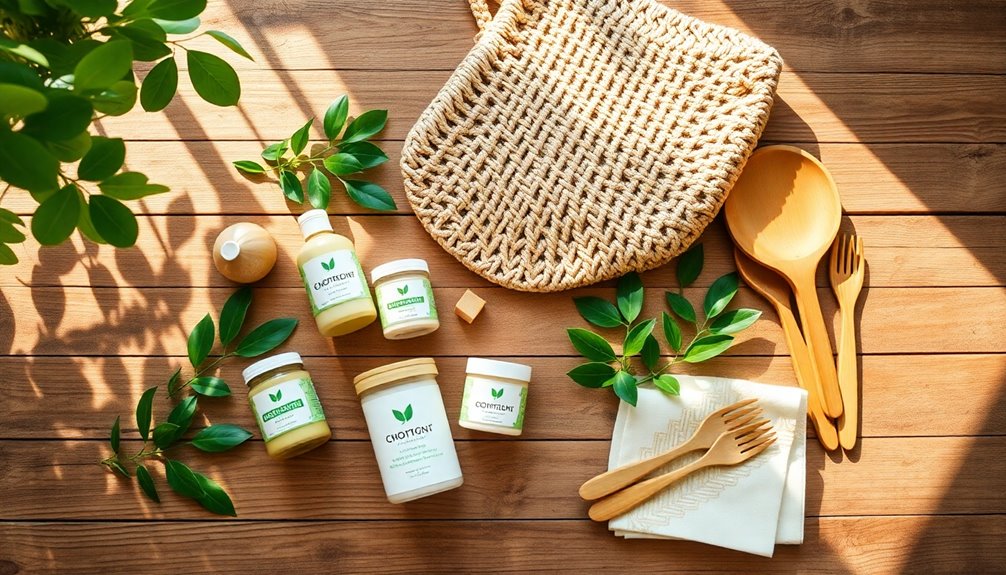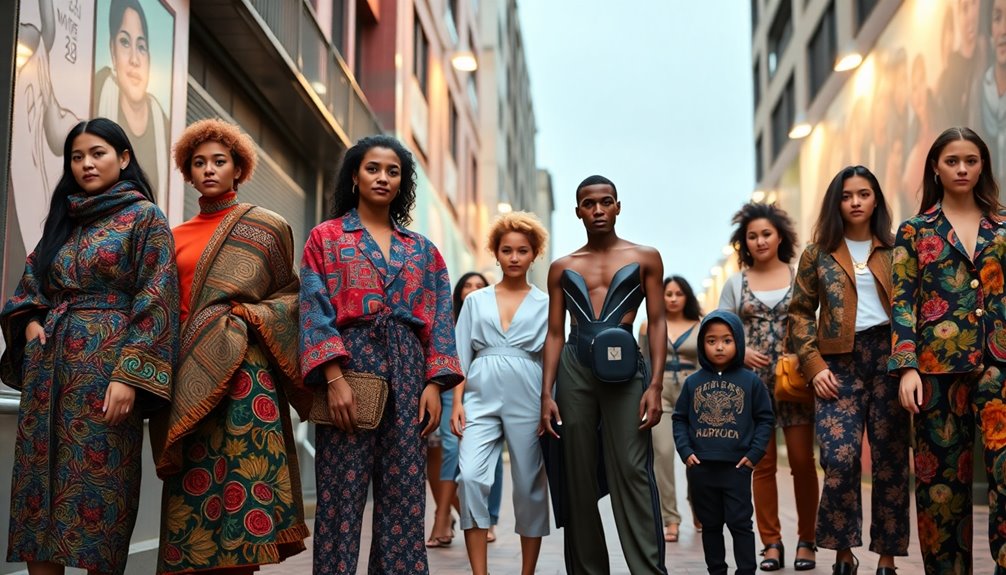You're about to fall in love with incredible sustainable brands committed to making a difference. From Starbucks, which aims for zero waste, to Nike's innovative recycling programs, these companies prioritize eco-friendly practices. Ikea's focus on renewable energy and Good Change Store's natural cleaning solutions showcase their dedication. Explore Paka Apparel's ethical fashion and JuneShine's zero-waste brewing. Unilever leads in sustainable packaging, and Patagonia embodies environmental activism. Each brand not only protects the planet but also offers products you'll adore. Stick around, and you'll uncover even more fantastic brands that charm both you and the environment.
Key Takeaways
- Starbucks aims for significant sustainability impacts with reusable packaging, carbon emission reductions, and Greener Store certifications to enhance eco-consciousness.
- Nike diverts over 1 billion plastic bottles yearly and targets a 30% reduction in supply chain emissions by 2030, promoting sustainable innovation.
- Paka Apparel offers eco-friendly materials and compostable packaging while supporting fair trade practices for Peruvian weavers, fostering a circular economy.
- Mananalu promotes sustainability with aluminum bottles that combat ocean-bound plastic waste, encouraging a shift from single-use plastics to reusable options.
- JuneShine operates a zero-waste facility using 100% organic ingredients and clean energy, supporting environmental nonprofits and innovative waste management.
Starbucks
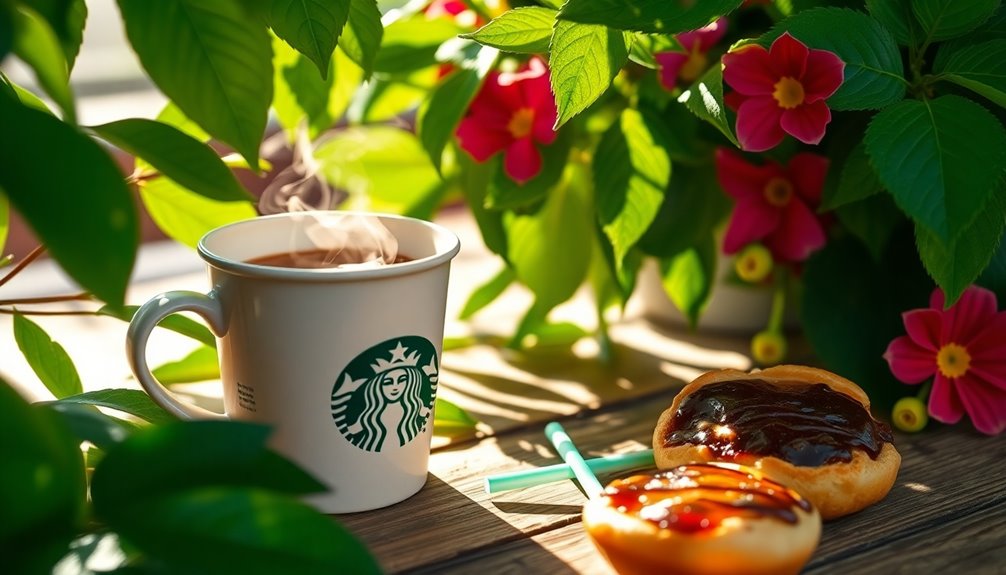
As Starbucks continues its commitment to sustainability, you're likely to notice the company's ambitious goals and initiatives aimed at reducing its environmental footprint.
They aim to cut carbon emissions by 50% and waste sent to landfills by the same percentage by 2030. Starbucks also plans to conserve or replenish half of the water used in operations and make all customer-facing packaging reusable, recyclable, or compostable. Over 31,000 stores globally highlights the scale at which Starbucks operates and the potential impact of these sustainability efforts.
With over 6,091 Greener Stores certified worldwide, they're on track to reach 10,000 by 2025. These stores reduce CO2 emissions and save significant operating costs.
Additionally, Starbucks partners with 400,000 farmers to implement sustainable farming practices, ensuring a responsible supply chain while promoting climate-resilient coffee varieties.
Nike
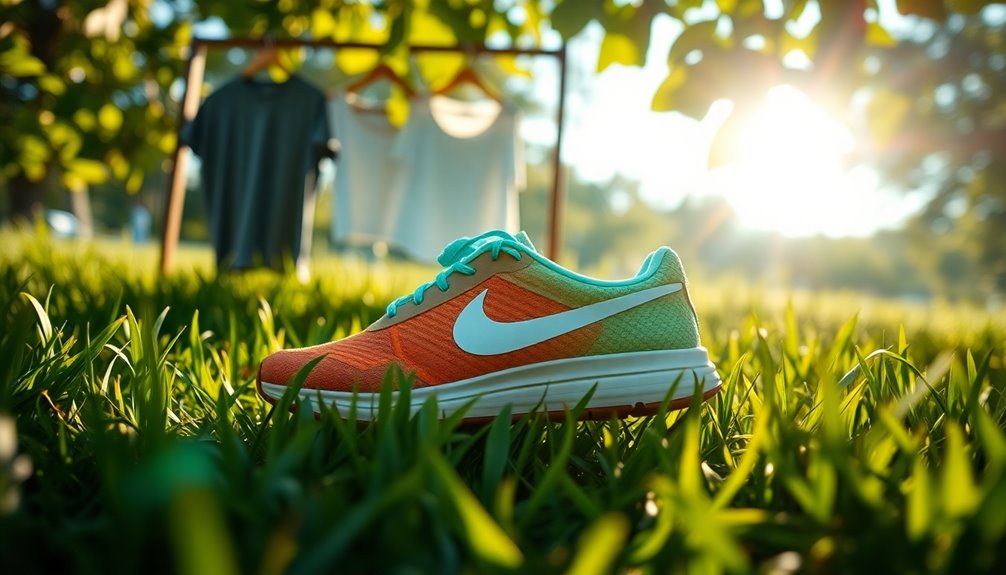
While Starbucks sets ambitious sustainability goals in the coffee industry, Nike is equally committed to reducing its environmental impact in the world of sportswear.
You'll love how Nike aims to cut greenhouse gas emissions by 30% across its global supply chain by 2030. The company has already diverted over 1 billion plastic bottles yearly for new products, showcasing their dedication to sustainable practices. This commitment aligns with their focus on energy-efficient technology, which helps reduce overall resource consumption.
They're also targeting 100% waste diversion from landfills and using innovative materials like Flyknit, which incorporates recycled plastic bottles into their shoes.
Nike's Grind program has recycled over 28 million worn-out shoes into valuable materials since 1992.
By 2025, they plan to power their facilities with 100% renewable energy and reduce fresh water usage in textile dyeing by 25%.
With these efforts, Nike is proving that sustainability can go hand-in-hand with performance.
Ikea

Ikea is making impressive strides toward sustainability, aiming to reduce its carbon footprint greatly.
You'll love that the company has cut its total climate footprint by 22% since 2016, with greenhouse gas emissions dropping by 11.5% last year alone.
They're focused on renewable energy, having invested greatly in wind and solar power, with 142 factories now using 100% renewable electricity. Additionally, Ikea is committed to ongoing monitoring of its carbon footprint to ensure continuous improvements.
Plus, Ikea is developing products from renewable materials, like bamboo, and plans to eliminate all plastic packaging by 2028.
Their ambitious goal to become climate positive by 2030 shows their commitment to reducing emissions without relying solely on carbon offsets.
With these efforts, Ikea isn't just a furniture store; it's a leader in sustainable living.
Paka Apparel

Paka Apparel stands out in the sustainable fashion landscape by prioritizing eco-friendly materials and ethical practices. They use bio-based materials like alpaca wool, Tencel, bamboo, and organic cotton, while limiting petroleum-based materials to recycled options. Their commitment to sustainability extends to compostable packaging and a focus on reducing waste through sorting and recycling. Paka is a certified B Corp, recognized as Best for the World in 2021 and 2022. They support fair trade employment for Peruvian weavers, ensuring living wages and funding education for young women. Paka has also received the Editors' Choice Award for their performance socks, showcasing their dedication to quality and innovation. With high-quality, durable apparel designed for longevity, Paka encourages a circular economy, making you feel good about your fashion choices. You'll love wearing their innovative pieces while supporting the planet!
August
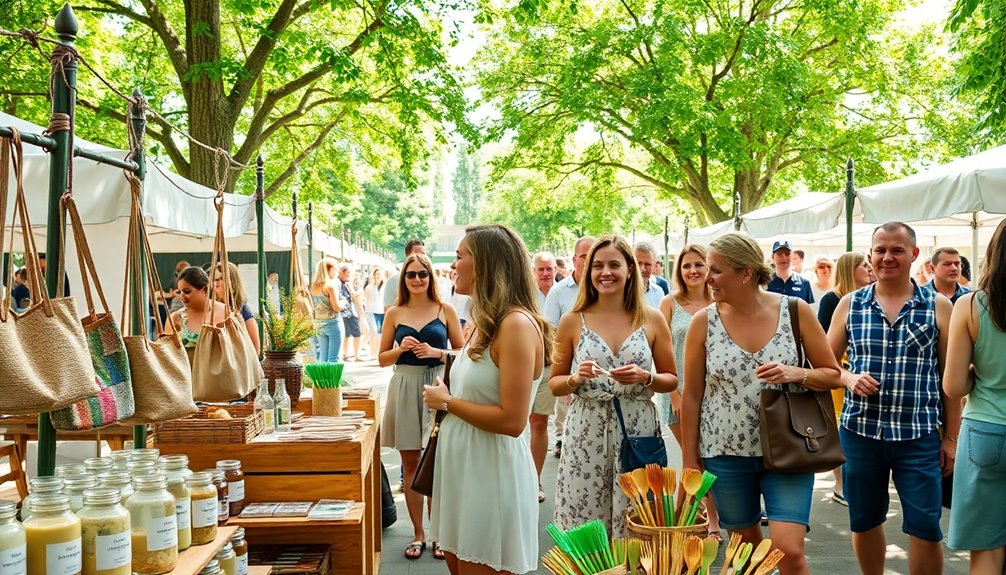
Sustainable fashion isn't just limited to clothing; it extends to personal care products as well. August offers a brilliant line of menstrual care items, featuring tampons and pads made from 100% organic cotton.
Sourced ethically from certified farms in Mesin, Turkey, their products contain no synthetic materials or harmful chemicals, prioritizing both your well-being and environmental health. Moreover, August's commitment to sustainability aligns with the broader trend of using organic materials in eco-friendly products.
Committed to sustainability, August is climate neutral certified and offsets its carbon footprint while partnering with organizations like Plastic Collective to recycle plastics.
As a women-owned brand, they promote gender equality and transparency in their supply chain.
With a 10% profit-sharing program, they fund period-advocacy initiatives, making August not just a brand, but a movement toward a more sustainable and inclusive future.
Mananalu
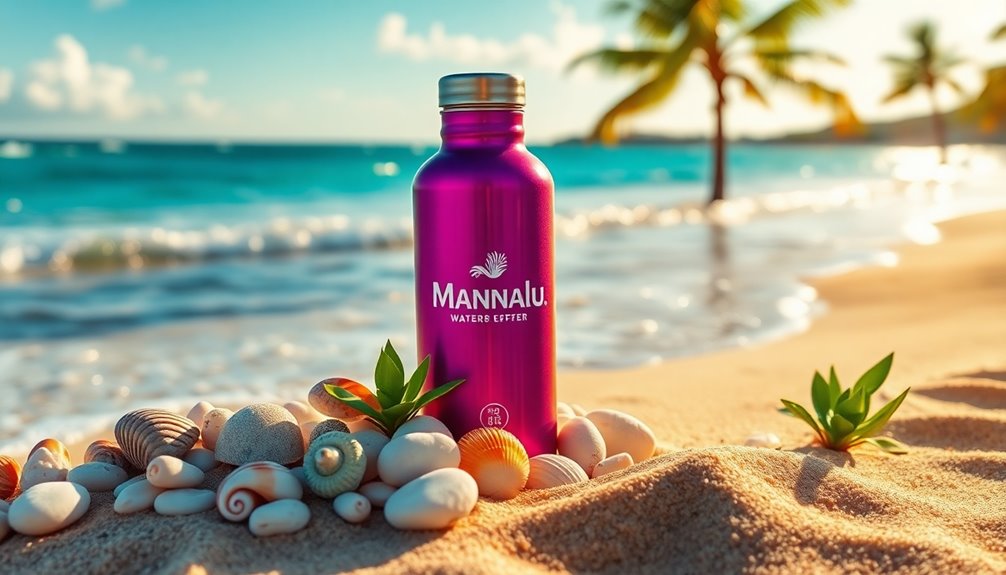
Mananalu, founded by actor and ocean activist Jason Momoa in 2019, is on a mission to combat plastic waste in our oceans.
Based in Boone, North Carolina, this brand offers purified drinking water in infinitely recyclable aluminum bottles, made from at least 60% recycled aluminum. Each purchase contributes to the removal of one bottle's worth of ocean-bound plastic from the environment. Additionally, the brand has implemented efficient waste management practices to further support its environmental initiatives.
You can choose from invigorating flavors like Pure, Tahitian Lime, and Lilikoi Passion, all in resealable bottles designed to reduce single-use plastic.
For every bottle sold, Mananalu removes one plastic bottle from ocean-bound waste through its partnership with rePurpose Global.
They're also teaming up with businesses to promote circular sustainability.
Patagonia
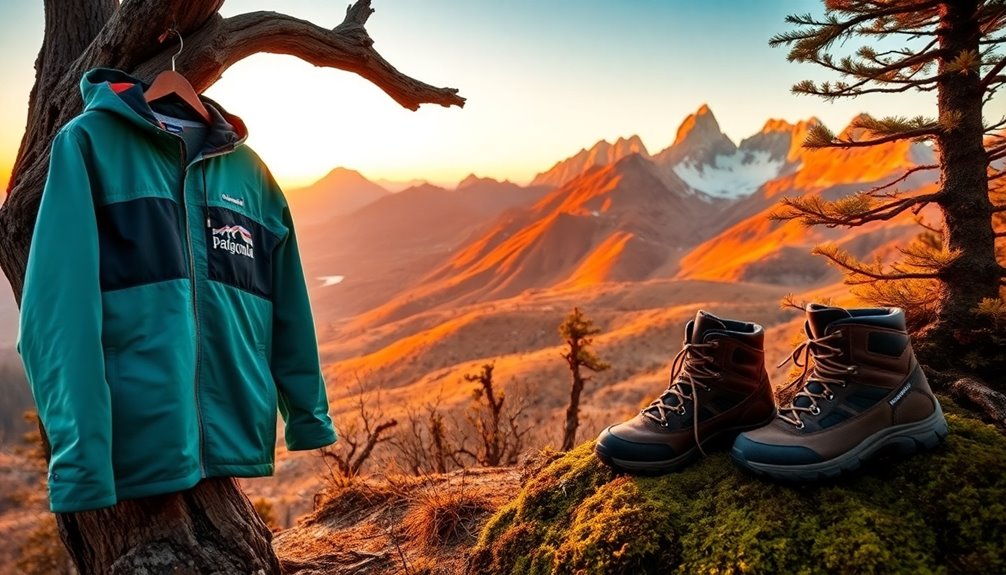
Patagonia stands out as a leader in environmental responsibility and ethical business practices. You'll appreciate their commitment to sustainability, from investing in renewable energy projects to offset carbon emissions. With a goal of 100% renewable energy in their stores and zero-emission shipping, they're shaping a greener future. Patagonia designs durable products and encourages you to participate in their Worn Wear program, promoting repair and reuse to extend the life of your gear. They also use recycled materials and maintain transparency in their supply chain, ensuring fair labor practices. By prioritizing ethical treatment of workers, they uphold industry standards that inspire others to adopt sustainable practices. Additionally, their initiatives contribute to reducing carbon emissions associated with traditional energy sources. By donating 1% of sales to environmental causes, they actively support grassroots initiatives. Choosing Patagonia means aligning with a brand that truly cares about the planet.
JuneShine

JuneShine is making waves in the beverage industry by prioritizing sustainability and eco-friendly practices. They source 100% organic ingredients, ensuring sustainable soil management while donating 1% of sales to environmental nonprofits. Their commitment to environmental health ensures that every ingredient choice supports a better planet.
By partnering with Climate Neutral, they measure and offset their carbon footprint, aiming to eliminate single-use plastics and create a zero-waste brewing facility. Utilizing 100% clean energy, JuneShine captures and reuses CO2 from fermentation and treats wastewater for reuse. Their waste separation program and the San Diego Brewcycling Cooperative help divert waste from landfills.
You'll love that they use cardboard six-pack holders and are working towards printed cans. JuneShine also engages customers in eco-friendly initiatives, making sustainability a shared journey. Enjoy revitalizing drinks that give back to the planet!
Unilever
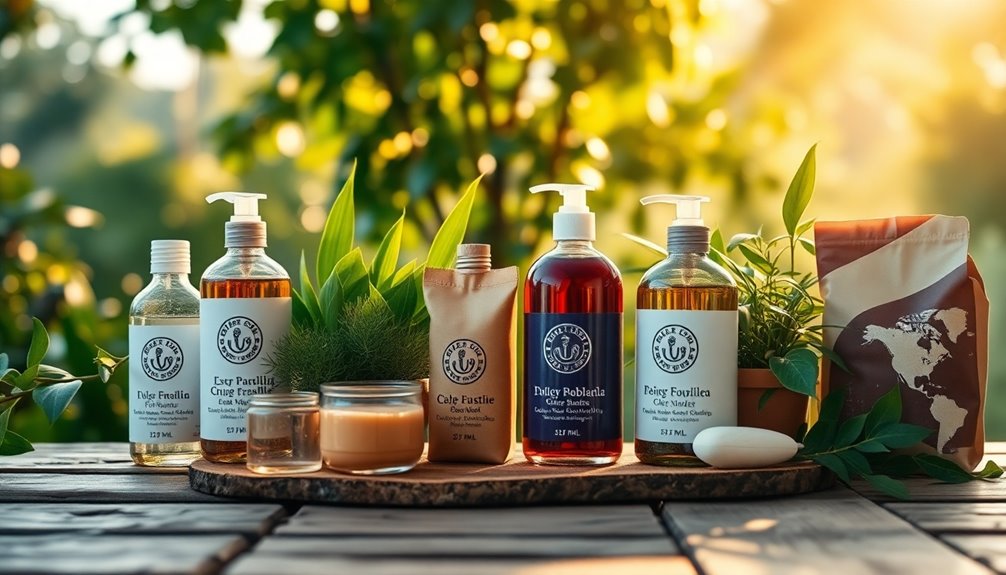
As the beverage industry embraces sustainability, major players like Unilever are stepping up their game with ambitious goals and innovative initiatives.
They aim for net-zero emissions across their value chain by 2039 and a deforestation-free supply chain by 2023. Unilever plans to halve its use of virgin plastic and guarantee 100% of its packaging is recyclable, reusable, or compostable by 2025.
Their Sustainable Living Brands are thriving, growing 69% faster than the rest of the business, and driving 75% of their overall growth. This impressive growth highlights the increasing consumer demand for sustainable living brands, which has become a focal point for Unilever's strategy.
With a strong commitment to sourcing key crops sustainably and reducing plastic waste, Unilever isn't just transforming its operations but also positively impacting communities through various social and environmental programs.
Good Change Store
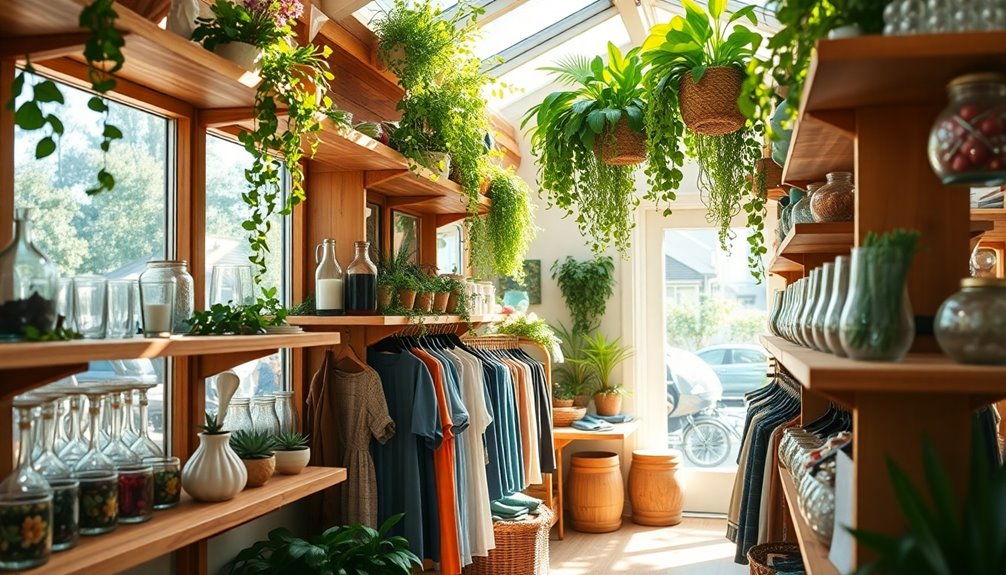
Sustainable Brands You'll Fall in Love With!
Good Change Store
While many cleaning products flood the market with harmful chemicals, Good Change Store offers a revitalizing alternative with its range of natural, eco-luxe cleaning solutions.
You'll love their reusable bamboo towels, eco cloths, and eco scrubs, all crafted from sustainable materials. Their refill tablets for all-purpose, bathroom, and kitchen cleaners replace 500ml of regular sprays, cutting down on waste. These products are designed to minimize environmental impact while delivering effective cleaning results.
Eco cloths last up to nine months, are dishwasher-safe, and compostable, while bamboo towels can be reused 85 times.
With over 100,000 satisfied customers across New Zealand and Australia, Good Change Store is committed to reducing plastic waste and promoting sustainability.
Join their mission and make a positive impact with innovative, effective cleaning products that care for our planet.
Frequently Asked Questions
How Do These Brands Ensure Their Materials Are Ethically Sourced?
To guarantee materials are ethically sourced, these brands prioritize transparency in their supply chains.
They share sourcing practices and engage in regular audits to uphold standards. You'll notice they support fair labor practices, guaranteeing workers receive living wages and safe conditions.
By choosing sustainable materials and implementing waste reduction strategies, they demonstrate a commitment to environmental stewardship.
Additionally, they use technology for traceability, making it easier for you to trust their sourcing decisions.
What Certifications Do These Brands Hold for Sustainability?
These brands hold various certifications to demonstrate their commitment to sustainability.
You'll find USDA Organic for food and cosmetics, Fair for Life for responsible supply chains, and Rainforest Alliance Certified for environmental management.
For textiles, Global Organic Textile Standard (GOTS) guarantees high social and environmental standards.
Additionally, certifications like ECOLOGO® and Cradle to Cradle prioritize eco-friendly practices, while UL GREENGUARD focuses on low chemical emissions.
Each certification reflects a brand's dedication to sustainable practices.
Are These Brands Involved in Any Local Community Initiatives?
Yes, these brands actively engage in local community initiatives.
They partner with non-profits, support local artisans, and create job opportunities by prioritizing fair wages.
You'll see them hosting workshops and events that promote local creativity and skills.
By collaborating with local organizations, they not only enhance their reputation but also contribute to community development.
Their focus on ethical practices empowers disadvantaged communities, fostering a sense of pride and teamwork among residents.
How Can Consumers Verify the Sustainability Claims Made by These Brands?
To verify sustainability claims, you should look for certifications from reputable third-party organizations, ensuring they're independently audited.
Be cautious of vague terms like "eco-friendly" and seek specific, data-backed information instead.
Check the brand's transparency about sourcing and practices through accessible reports.
Finally, assess if their actions align with their claims, ensuring consistency in their sustainability efforts.
Doing this will help you make informed choices about truly sustainable brands.
What Are the Long-Term Goals of These Brands Regarding Sustainability?
These brands aim for ambitious long-term sustainability goals.
You'll find Target committing to net zero emissions by 2040 and achieving 100% renewable electricity by 2030.
Starbucks focuses on reducing its carbon footprint and ethically sourcing coffee.
Unilever targets net-zero emissions by 2039 while promoting sustainable practices throughout its supply chain.
Mars plans for net-zero emissions by 2050, emphasizing sustainable sourcing and circular economy practices.
Each brand integrates sustainability into its core operations for a greener future.
Conclusion
In a world where sustainability matters more than ever, exploring these brands is a fantastic start. Each one showcases how style and eco-consciousness can go hand-in-hand, making it easier for you to make responsible choices. Whether you're sipping coffee from Starbucks or rocking Paka Apparel, you're supporting a brighter future. So go ahead, fall in love with these sustainable brands and make a positive impact with every purchase you make!

